In the Gondalpur panchayat, situated in the Hazaribagh district of Jharkhand, villagers are on a struggle path with a resolve not to give even an inch of their land to Adani, NTPC and JSW companies. Leaders of left parties expressed their solidarity with the ongoing sit-in.
The North Karnapura region is situated in the south-west of Hazaribagh district. This region is endowed with a lot of natural beauty comprising of medicinal plants, hills and forests. There are also large patches of fertile flat land in which farmers produce 2-3 crops in a year. 22 small and big rivers originate from the hills of this area. There is an elephant corridor in this area. Coal and other minerals are present in this region.
This region is historically of significance. It encompasses Isko, Mahodi, Kolhua and Pakri-Barwadeeh hills. These hills contain numerous caves which were once home to the primitive man. Signs and drawings on the cave walls shed light on the life, language and culture of that time. The remnants of the capital of Ramgarh king (1368 A.D.) and forts of Badam (1600 A.D.) are still present.
Today, when the humanity is facing severe environmental crisis, this region needs to be conserved. Small check dams can be constructed to supply water to the fields as well as generate electricity. The region can supply grains and vegetables. However, with the advent of the Modi government, the corporates like Ambani-Adani, Jindal-Mittal, Hindalco, Dalmia, NTPC and JSW along with foreign companies- in all 35 companies- have been allotted coal blocks in North Karnpur. The Karnpur Bachao Sangarsh Samiti has been leading a movement since 2004 to protect this region.
After the establishment of Tata industry and HEC in Jamshedpur and Ranchi respectively, dozens of villages were uprooted and the residents lost their land as well as culture. The affected could not get the promised job. The villagers of Gondalpura panchayat do not want to lose their land, identity and culture. They are witnessing the dispossession of Pakri-Barwadih villages after the commissioning of the NTPC plant. The people have been fighting against the Koel Karo project as well as the Netharhat firing range. Many people have lost their lives but the fight continues. The villagers of Gondalpur have initiated their struggle to save their water, forests and land.
About 130 people have been booked for breach of peace and a zilabadar notice has been served to an innocent youth to expel him out of district. The Gondalpura coal block lying in North Karmpura coal region was allotted to Adani Enterprises in 2020. Five villages are being affected by this project. In the Goandalpura, Gaali, Balodar, Hahe and Phulang villages, 1268.5 acre of land has been acquired for coal mining out of which 551.9 acre is Raiyat land, 542.75 acre is forest land and 173.74 acre is Gair Majarua land. In Gondalpur 284.63 acre, in Gaali 175.45 acre and 91.51 acre Raiyat land will be acquired. There will be no acquisition of Raiyat land in Hahe and Phulang villages. A total of 781 families would be displaced by the project.
The 550 odd acre of land to be acquired in three villages is very fertile and produces multiple crops and vegetables. Because of water conservation from the neighbouring hills, the water table is very high at 20 feet. An acre of land produces 20-25 quintal of paddy. Chilly and sugarcane crop is produced and the jaggery is of a very high quality. The chilly farming fetches as much as 20-25 thousand rupees to a farmer every year.
The land to be acquired has hills, jungles and rivers. The juggles are home to Sakhua, Mahua, Kendr, Piyar, Badhar, Jamun and Jackfruit as well as many herbs and edible roots. Many rivers originate in this area. In Balodar village, Gogardha and Gudlagwa rivers flow while Kare Rekha flows through Gali village and Gate Kocha flow through Hahe village. These four rivers join together to form Dhol Katwa river which later becomes the Badmahee river. This river merges with Damodar river in Vishrampur. Mining would destroy the origin of these rivers and eventually dry them.
These forests are home to elephants, bears, peacocks and rabbits. The jungle forms part of the elephant corridor. Destruction of the jungles would also destroy the habitat of these animals.
For acquiring the land, a Jan Sunwai took place on 15 July, 2020. The villagers unanimously voiced their protest over the takeover because it violated the provisions of the Land Acquisition Act of 2013. Under the Forest Rights Act 2006, 2008 and 2012, prior to acquisition, consent of 80 % people is required. The Deputy Commissioner prepared a fabricated report favouring Adani in which it was said that considering the issues of environment, collective good and development, the majority of the people were in favour of the project!










